JCU HRM Report: Exploring Transferable Skills in the Workplace
VerifiedAdded on 2022/10/18
|25
|5714
|9
Report
AI Summary
This report delves into the critical role of transferable skills within Human Resource Management. It begins with an introduction and literature review, defining transferable skills and highlighting their importance in the workplace, referencing various sources and academic papers. The report analyzes job advertisements to identify essential skills sought by employers, such as communication, teamwork, problem-solving, and leadership. The findings section synthesizes the identified skills and their relevance, while the discussion explores the challenges and opportunities in skill development, particularly in the context of business education and the evolving demands of the job market. The report emphasizes the value of soft skills, teamwork, and analytical abilities, concluding with recommendations for skill enhancement and career success. Appendices provide additional data and supporting materials, including examples of job advertisements and further analysis.
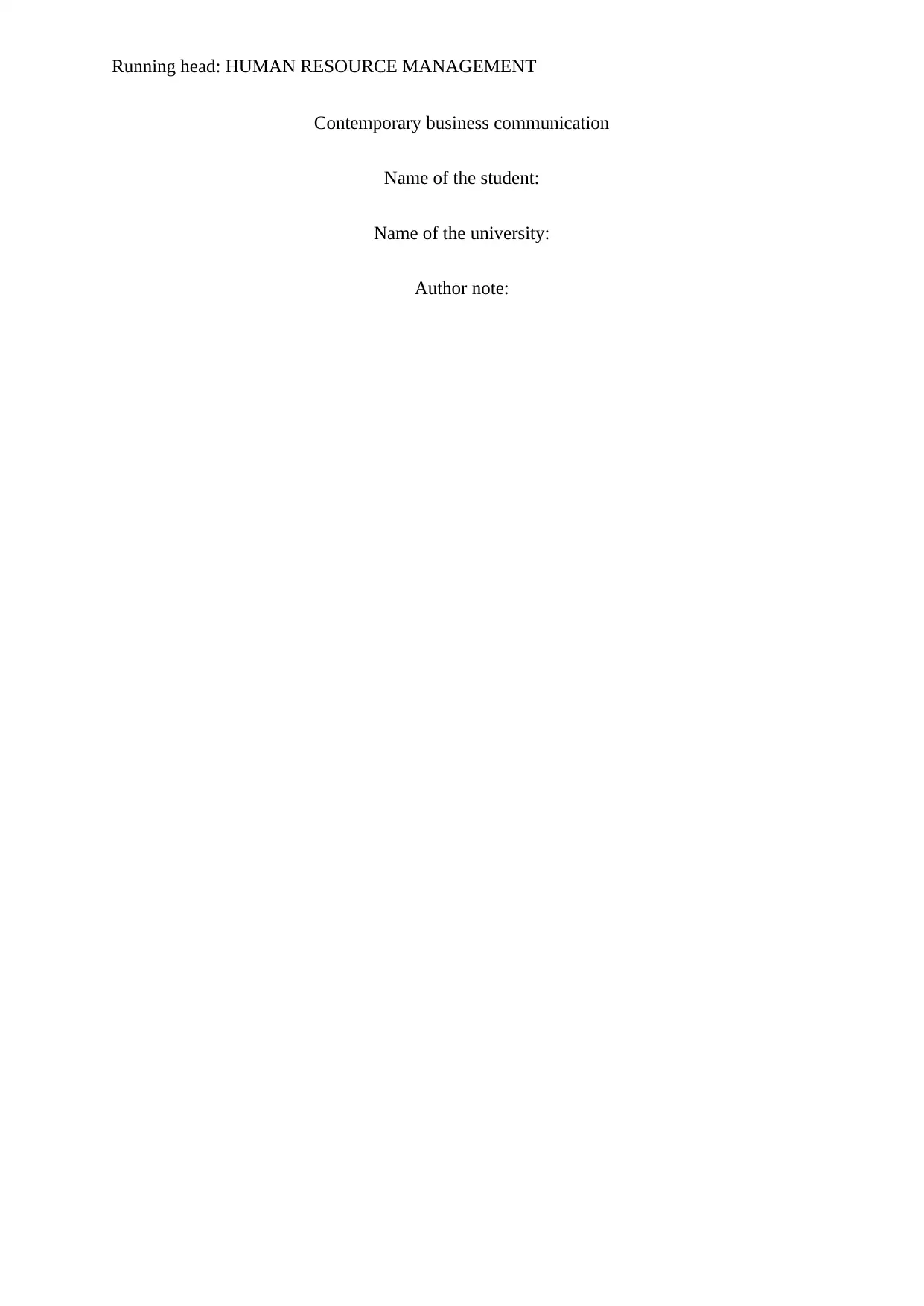
Running head: HUMAN RESOURCE MANAGEMENT
Contemporary business communication
Name of the student:
Name of the university:
Author note:
Contemporary business communication
Name of the student:
Name of the university:
Author note:
Paraphrase This Document
Need a fresh take? Get an instant paraphrase of this document with our AI Paraphraser
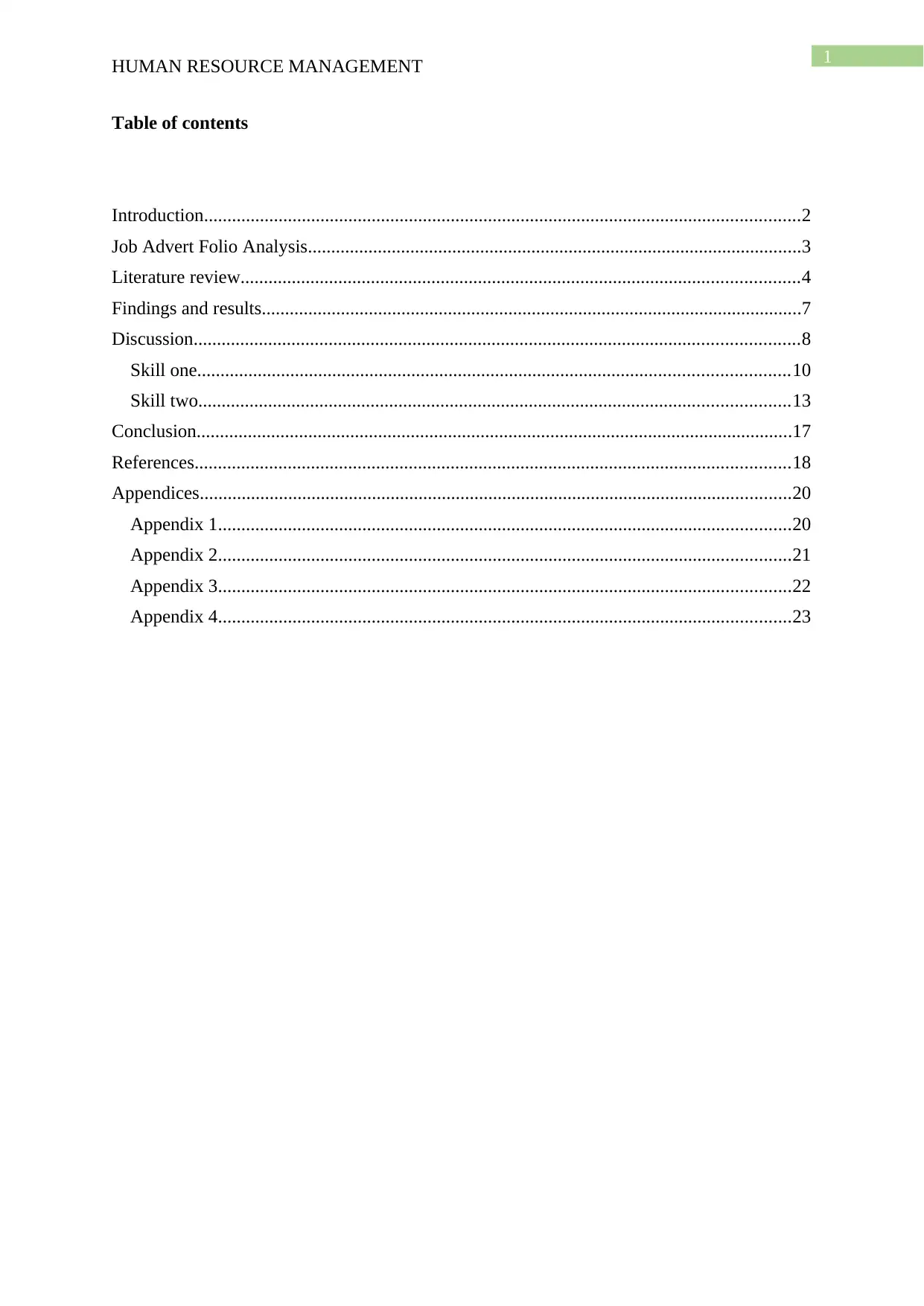
1
HUMAN RESOURCE MANAGEMENT
Table of contents
Introduction................................................................................................................................2
Job Advert Folio Analysis..........................................................................................................3
Literature review........................................................................................................................4
Findings and results....................................................................................................................7
Discussion..................................................................................................................................8
Skill one...............................................................................................................................10
Skill two...............................................................................................................................13
Conclusion................................................................................................................................17
References................................................................................................................................18
Appendices...............................................................................................................................20
Appendix 1...........................................................................................................................20
Appendix 2...........................................................................................................................21
Appendix 3...........................................................................................................................22
Appendix 4...........................................................................................................................23
HUMAN RESOURCE MANAGEMENT
Table of contents
Introduction................................................................................................................................2
Job Advert Folio Analysis..........................................................................................................3
Literature review........................................................................................................................4
Findings and results....................................................................................................................7
Discussion..................................................................................................................................8
Skill one...............................................................................................................................10
Skill two...............................................................................................................................13
Conclusion................................................................................................................................17
References................................................................................................................................18
Appendices...............................................................................................................................20
Appendix 1...........................................................................................................................20
Appendix 2...........................................................................................................................21
Appendix 3...........................................................................................................................22
Appendix 4...........................................................................................................................23
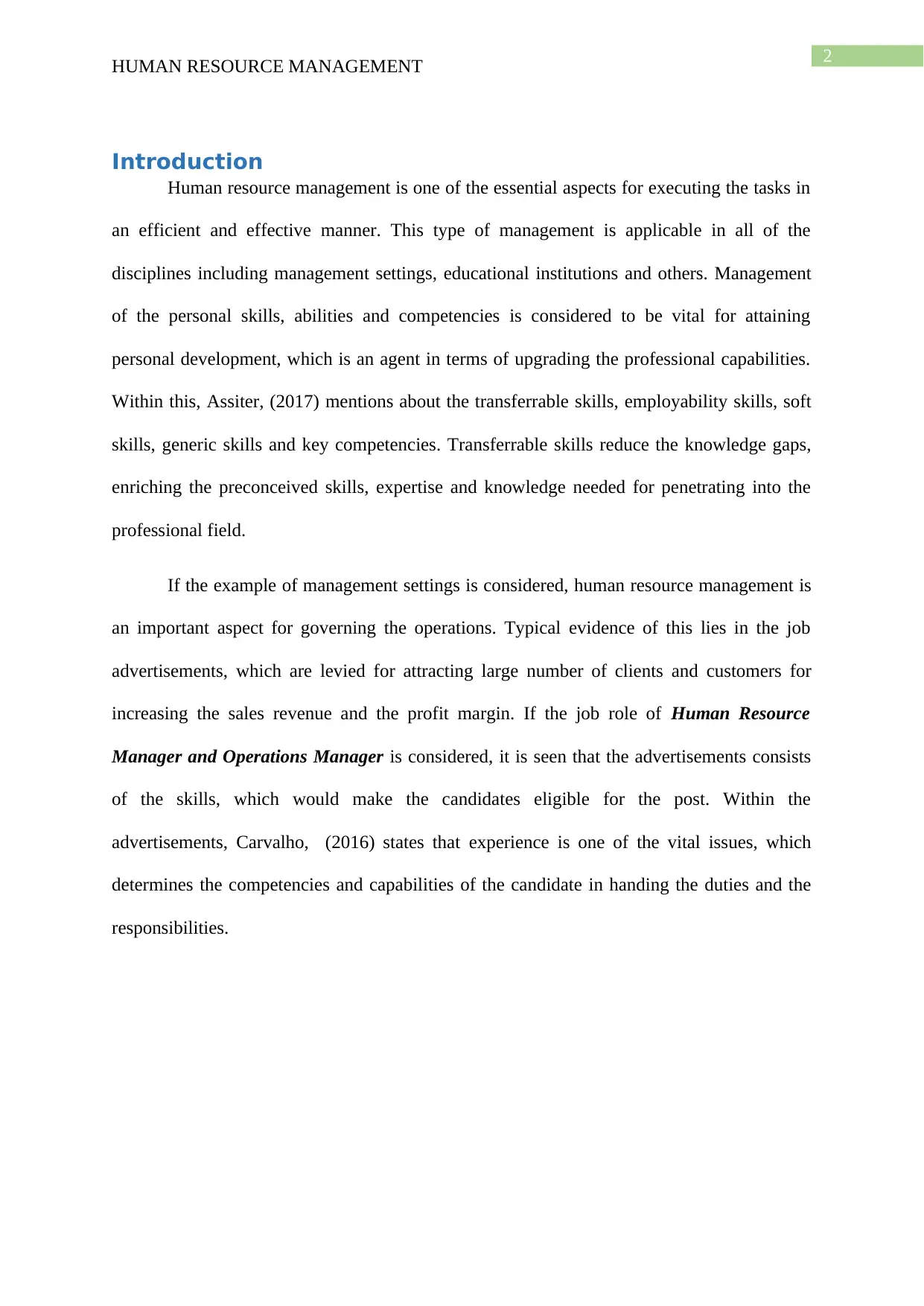
2
HUMAN RESOURCE MANAGEMENT
Introduction
Human resource management is one of the essential aspects for executing the tasks in
an efficient and effective manner. This type of management is applicable in all of the
disciplines including management settings, educational institutions and others. Management
of the personal skills, abilities and competencies is considered to be vital for attaining
personal development, which is an agent in terms of upgrading the professional capabilities.
Within this, Assiter, (2017) mentions about the transferrable skills, employability skills, soft
skills, generic skills and key competencies. Transferrable skills reduce the knowledge gaps,
enriching the preconceived skills, expertise and knowledge needed for penetrating into the
professional field.
If the example of management settings is considered, human resource management is
an important aspect for governing the operations. Typical evidence of this lies in the job
advertisements, which are levied for attracting large number of clients and customers for
increasing the sales revenue and the profit margin. If the job role of Human Resource
Manager and Operations Manager is considered, it is seen that the advertisements consists
of the skills, which would make the candidates eligible for the post. Within the
advertisements, Carvalho, (2016) states that experience is one of the vital issues, which
determines the competencies and capabilities of the candidate in handing the duties and the
responsibilities.
HUMAN RESOURCE MANAGEMENT
Introduction
Human resource management is one of the essential aspects for executing the tasks in
an efficient and effective manner. This type of management is applicable in all of the
disciplines including management settings, educational institutions and others. Management
of the personal skills, abilities and competencies is considered to be vital for attaining
personal development, which is an agent in terms of upgrading the professional capabilities.
Within this, Assiter, (2017) mentions about the transferrable skills, employability skills, soft
skills, generic skills and key competencies. Transferrable skills reduce the knowledge gaps,
enriching the preconceived skills, expertise and knowledge needed for penetrating into the
professional field.
If the example of management settings is considered, human resource management is
an important aspect for governing the operations. Typical evidence of this lies in the job
advertisements, which are levied for attracting large number of clients and customers for
increasing the sales revenue and the profit margin. If the job role of Human Resource
Manager and Operations Manager is considered, it is seen that the advertisements consists
of the skills, which would make the candidates eligible for the post. Within the
advertisements, Carvalho, (2016) states that experience is one of the vital issues, which
determines the competencies and capabilities of the candidate in handing the duties and the
responsibilities.
⊘ This is a preview!⊘
Do you want full access?
Subscribe today to unlock all pages.

Trusted by 1+ million students worldwide
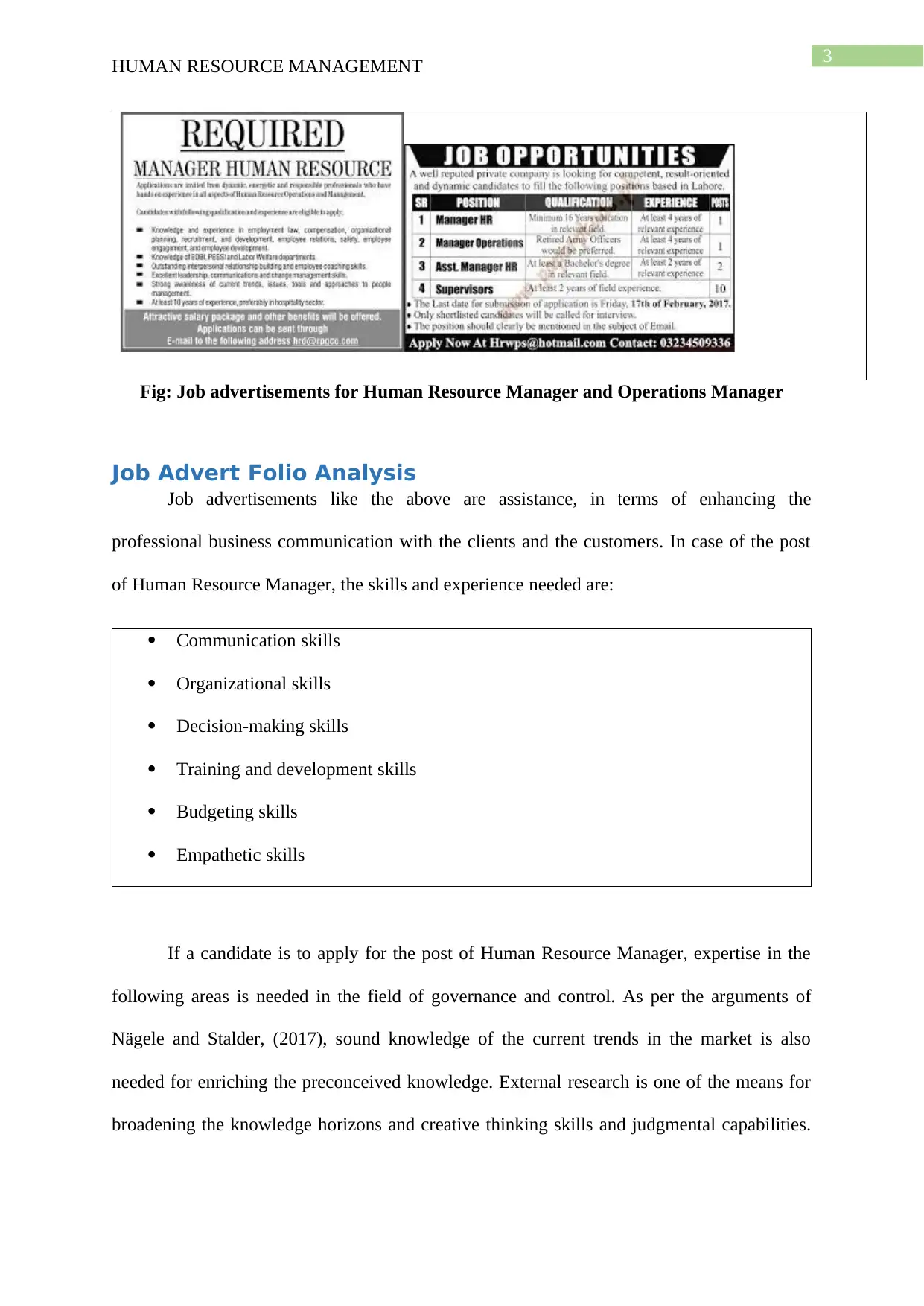
3
HUMAN RESOURCE MANAGEMENT
Fig: Job advertisements for Human Resource Manager and Operations Manager
Job Advert Folio Analysis
Job advertisements like the above are assistance, in terms of enhancing the
professional business communication with the clients and the customers. In case of the post
of Human Resource Manager, the skills and experience needed are:
Communication skills
Organizational skills
Decision-making skills
Training and development skills
Budgeting skills
Empathetic skills
If a candidate is to apply for the post of Human Resource Manager, expertise in the
following areas is needed in the field of governance and control. As per the arguments of
Nägele and Stalder, (2017), sound knowledge of the current trends in the market is also
needed for enriching the preconceived knowledge. External research is one of the means for
broadening the knowledge horizons and creative thinking skills and judgmental capabilities.
HUMAN RESOURCE MANAGEMENT
Fig: Job advertisements for Human Resource Manager and Operations Manager
Job Advert Folio Analysis
Job advertisements like the above are assistance, in terms of enhancing the
professional business communication with the clients and the customers. In case of the post
of Human Resource Manager, the skills and experience needed are:
Communication skills
Organizational skills
Decision-making skills
Training and development skills
Budgeting skills
Empathetic skills
If a candidate is to apply for the post of Human Resource Manager, expertise in the
following areas is needed in the field of governance and control. As per the arguments of
Nägele and Stalder, (2017), sound knowledge of the current trends in the market is also
needed for enriching the preconceived knowledge. External research is one of the means for
broadening the knowledge horizons and creative thinking skills and judgmental capabilities.
Paraphrase This Document
Need a fresh take? Get an instant paraphrase of this document with our AI Paraphraser
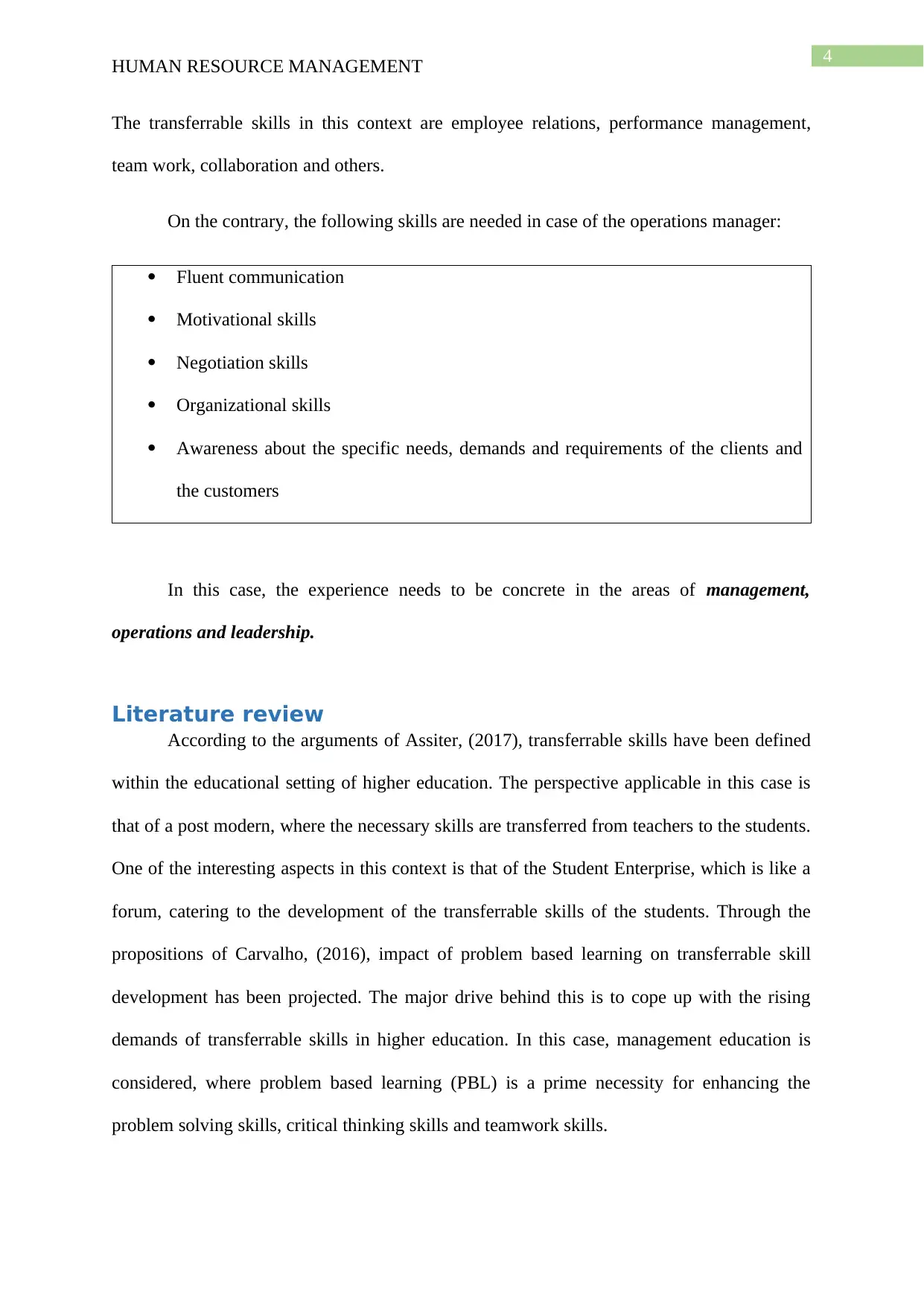
4
HUMAN RESOURCE MANAGEMENT
The transferrable skills in this context are employee relations, performance management,
team work, collaboration and others.
On the contrary, the following skills are needed in case of the operations manager:
Fluent communication
Motivational skills
Negotiation skills
Organizational skills
Awareness about the specific needs, demands and requirements of the clients and
the customers
In this case, the experience needs to be concrete in the areas of management,
operations and leadership.
Literature review
According to the arguments of Assiter, (2017), transferrable skills have been defined
within the educational setting of higher education. The perspective applicable in this case is
that of a post modern, where the necessary skills are transferred from teachers to the students.
One of the interesting aspects in this context is that of the Student Enterprise, which is like a
forum, catering to the development of the transferrable skills of the students. Through the
propositions of Carvalho, (2016), impact of problem based learning on transferrable skill
development has been projected. The major drive behind this is to cope up with the rising
demands of transferrable skills in higher education. In this case, management education is
considered, where problem based learning (PBL) is a prime necessity for enhancing the
problem solving skills, critical thinking skills and teamwork skills.
HUMAN RESOURCE MANAGEMENT
The transferrable skills in this context are employee relations, performance management,
team work, collaboration and others.
On the contrary, the following skills are needed in case of the operations manager:
Fluent communication
Motivational skills
Negotiation skills
Organizational skills
Awareness about the specific needs, demands and requirements of the clients and
the customers
In this case, the experience needs to be concrete in the areas of management,
operations and leadership.
Literature review
According to the arguments of Assiter, (2017), transferrable skills have been defined
within the educational setting of higher education. The perspective applicable in this case is
that of a post modern, where the necessary skills are transferred from teachers to the students.
One of the interesting aspects in this context is that of the Student Enterprise, which is like a
forum, catering to the development of the transferrable skills of the students. Through the
propositions of Carvalho, (2016), impact of problem based learning on transferrable skill
development has been projected. The major drive behind this is to cope up with the rising
demands of transferrable skills in higher education. In this case, management education is
considered, where problem based learning (PBL) is a prime necessity for enhancing the
problem solving skills, critical thinking skills and teamwork skills.
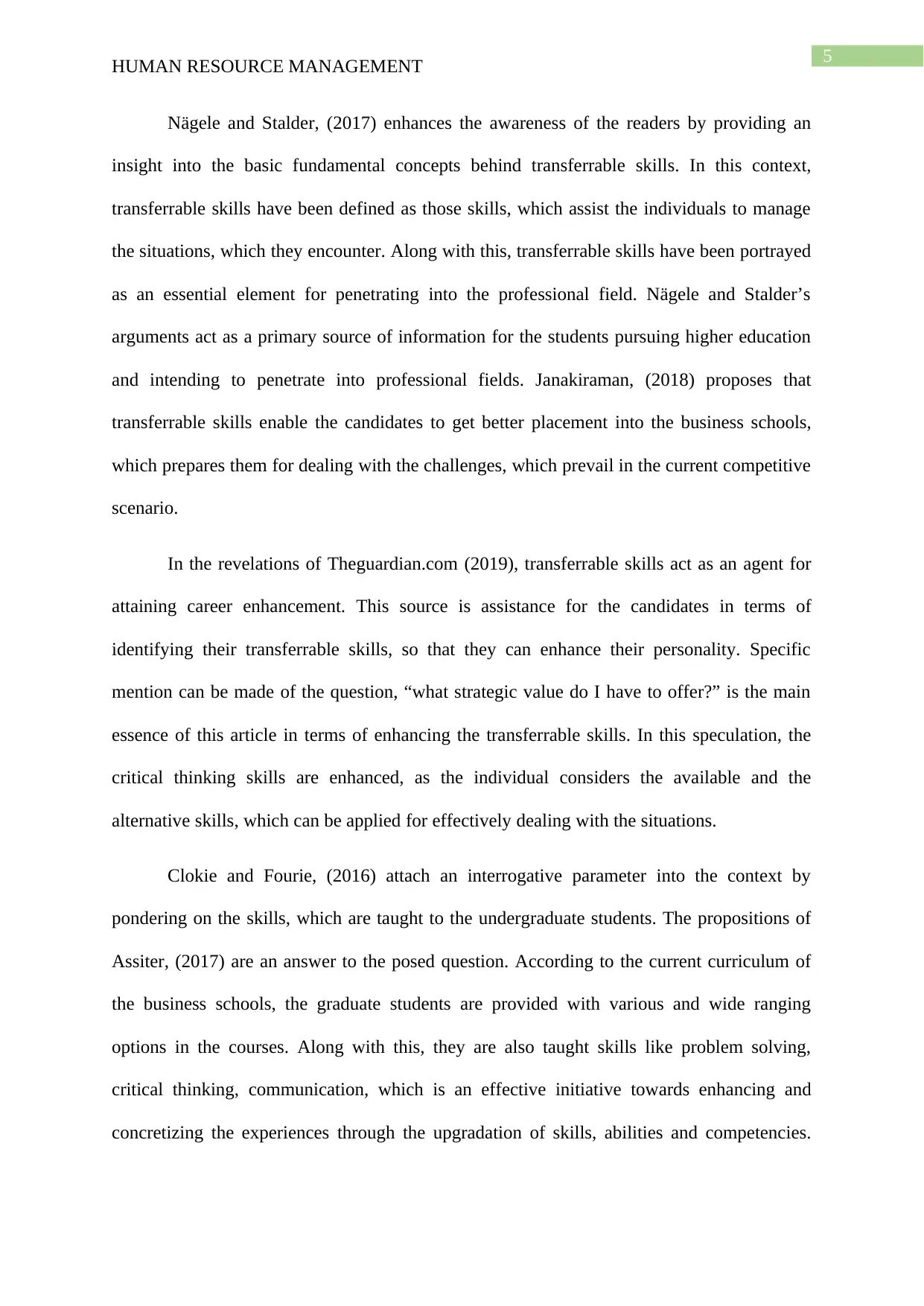
5
HUMAN RESOURCE MANAGEMENT
Nägele and Stalder, (2017) enhances the awareness of the readers by providing an
insight into the basic fundamental concepts behind transferrable skills. In this context,
transferrable skills have been defined as those skills, which assist the individuals to manage
the situations, which they encounter. Along with this, transferrable skills have been portrayed
as an essential element for penetrating into the professional field. Nägele and Stalder’s
arguments act as a primary source of information for the students pursuing higher education
and intending to penetrate into professional fields. Janakiraman, (2018) proposes that
transferrable skills enable the candidates to get better placement into the business schools,
which prepares them for dealing with the challenges, which prevail in the current competitive
scenario.
In the revelations of Theguardian.com (2019), transferrable skills act as an agent for
attaining career enhancement. This source is assistance for the candidates in terms of
identifying their transferrable skills, so that they can enhance their personality. Specific
mention can be made of the question, “what strategic value do I have to offer?” is the main
essence of this article in terms of enhancing the transferrable skills. In this speculation, the
critical thinking skills are enhanced, as the individual considers the available and the
alternative skills, which can be applied for effectively dealing with the situations.
Clokie and Fourie, (2016) attach an interrogative parameter into the context by
pondering on the skills, which are taught to the undergraduate students. The propositions of
Assiter, (2017) are an answer to the posed question. According to the current curriculum of
the business schools, the graduate students are provided with various and wide ranging
options in the courses. Along with this, they are also taught skills like problem solving,
critical thinking, communication, which is an effective initiative towards enhancing and
concretizing the experiences through the upgradation of skills, abilities and competencies.
HUMAN RESOURCE MANAGEMENT
Nägele and Stalder, (2017) enhances the awareness of the readers by providing an
insight into the basic fundamental concepts behind transferrable skills. In this context,
transferrable skills have been defined as those skills, which assist the individuals to manage
the situations, which they encounter. Along with this, transferrable skills have been portrayed
as an essential element for penetrating into the professional field. Nägele and Stalder’s
arguments act as a primary source of information for the students pursuing higher education
and intending to penetrate into professional fields. Janakiraman, (2018) proposes that
transferrable skills enable the candidates to get better placement into the business schools,
which prepares them for dealing with the challenges, which prevail in the current competitive
scenario.
In the revelations of Theguardian.com (2019), transferrable skills act as an agent for
attaining career enhancement. This source is assistance for the candidates in terms of
identifying their transferrable skills, so that they can enhance their personality. Specific
mention can be made of the question, “what strategic value do I have to offer?” is the main
essence of this article in terms of enhancing the transferrable skills. In this speculation, the
critical thinking skills are enhanced, as the individual considers the available and the
alternative skills, which can be applied for effectively dealing with the situations.
Clokie and Fourie, (2016) attach an interrogative parameter into the context by
pondering on the skills, which are taught to the undergraduate students. The propositions of
Assiter, (2017) are an answer to the posed question. According to the current curriculum of
the business schools, the graduate students are provided with various and wide ranging
options in the courses. Along with this, they are also taught skills like problem solving,
critical thinking, communication, which is an effective initiative towards enhancing and
concretizing the experiences through the upgradation of skills, abilities and competencies.
⊘ This is a preview!⊘
Do you want full access?
Subscribe today to unlock all pages.

Trusted by 1+ million students worldwide
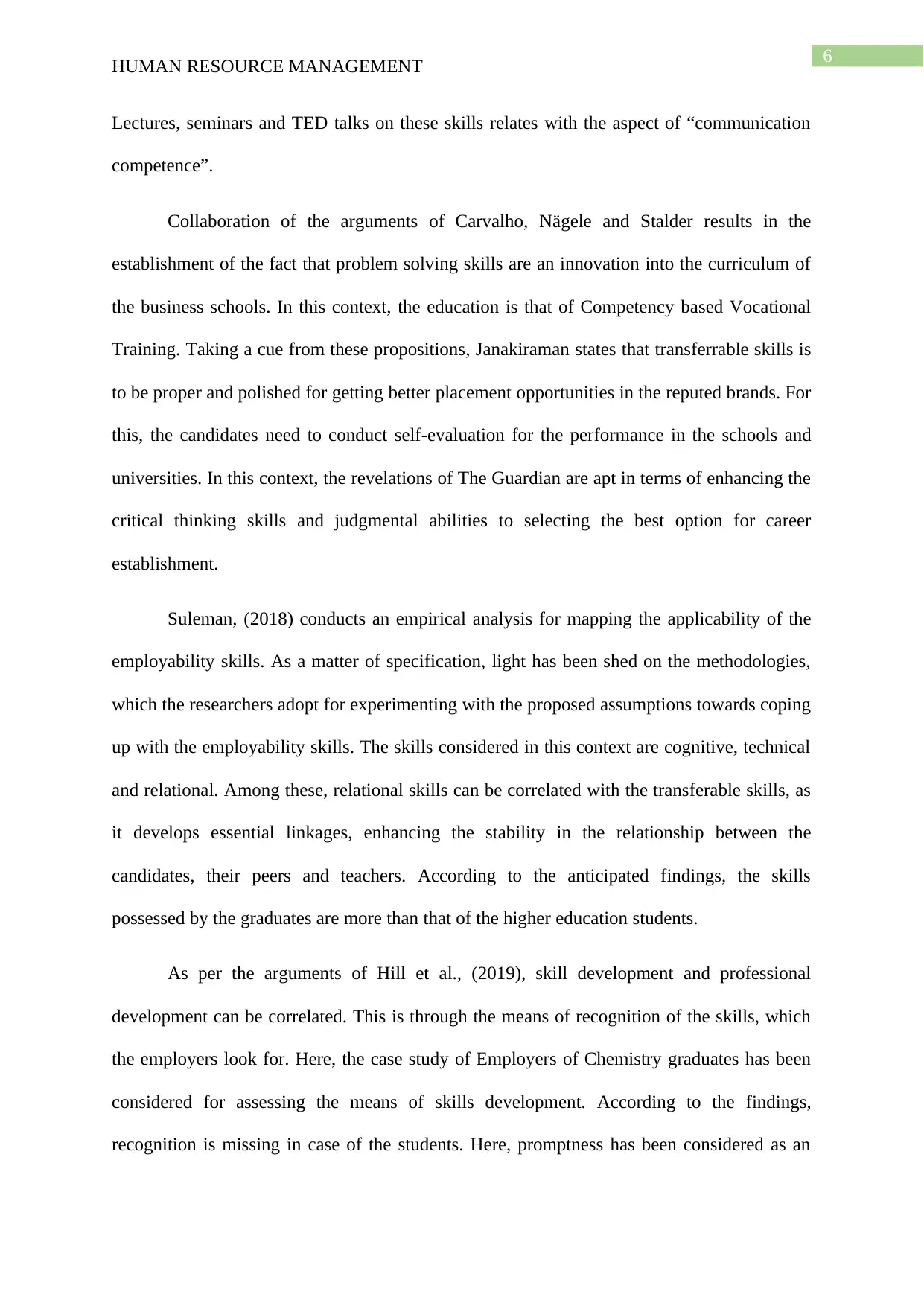
6
HUMAN RESOURCE MANAGEMENT
Lectures, seminars and TED talks on these skills relates with the aspect of “communication
competence”.
Collaboration of the arguments of Carvalho, Nägele and Stalder results in the
establishment of the fact that problem solving skills are an innovation into the curriculum of
the business schools. In this context, the education is that of Competency based Vocational
Training. Taking a cue from these propositions, Janakiraman states that transferrable skills is
to be proper and polished for getting better placement opportunities in the reputed brands. For
this, the candidates need to conduct self-evaluation for the performance in the schools and
universities. In this context, the revelations of The Guardian are apt in terms of enhancing the
critical thinking skills and judgmental abilities to selecting the best option for career
establishment.
Suleman, (2018) conducts an empirical analysis for mapping the applicability of the
employability skills. As a matter of specification, light has been shed on the methodologies,
which the researchers adopt for experimenting with the proposed assumptions towards coping
up with the employability skills. The skills considered in this context are cognitive, technical
and relational. Among these, relational skills can be correlated with the transferable skills, as
it develops essential linkages, enhancing the stability in the relationship between the
candidates, their peers and teachers. According to the anticipated findings, the skills
possessed by the graduates are more than that of the higher education students.
As per the arguments of Hill et al., (2019), skill development and professional
development can be correlated. This is through the means of recognition of the skills, which
the employers look for. Here, the case study of Employers of Chemistry graduates has been
considered for assessing the means of skills development. According to the findings,
recognition is missing in case of the students. Here, promptness has been considered as an
HUMAN RESOURCE MANAGEMENT
Lectures, seminars and TED talks on these skills relates with the aspect of “communication
competence”.
Collaboration of the arguments of Carvalho, Nägele and Stalder results in the
establishment of the fact that problem solving skills are an innovation into the curriculum of
the business schools. In this context, the education is that of Competency based Vocational
Training. Taking a cue from these propositions, Janakiraman states that transferrable skills is
to be proper and polished for getting better placement opportunities in the reputed brands. For
this, the candidates need to conduct self-evaluation for the performance in the schools and
universities. In this context, the revelations of The Guardian are apt in terms of enhancing the
critical thinking skills and judgmental abilities to selecting the best option for career
establishment.
Suleman, (2018) conducts an empirical analysis for mapping the applicability of the
employability skills. As a matter of specification, light has been shed on the methodologies,
which the researchers adopt for experimenting with the proposed assumptions towards coping
up with the employability skills. The skills considered in this context are cognitive, technical
and relational. Among these, relational skills can be correlated with the transferable skills, as
it develops essential linkages, enhancing the stability in the relationship between the
candidates, their peers and teachers. According to the anticipated findings, the skills
possessed by the graduates are more than that of the higher education students.
As per the arguments of Hill et al., (2019), skill development and professional
development can be correlated. This is through the means of recognition of the skills, which
the employers look for. Here, the case study of Employers of Chemistry graduates has been
considered for assessing the means of skills development. According to the findings,
recognition is missing in case of the students. Here, promptness has been considered as an
Paraphrase This Document
Need a fresh take? Get an instant paraphrase of this document with our AI Paraphraser
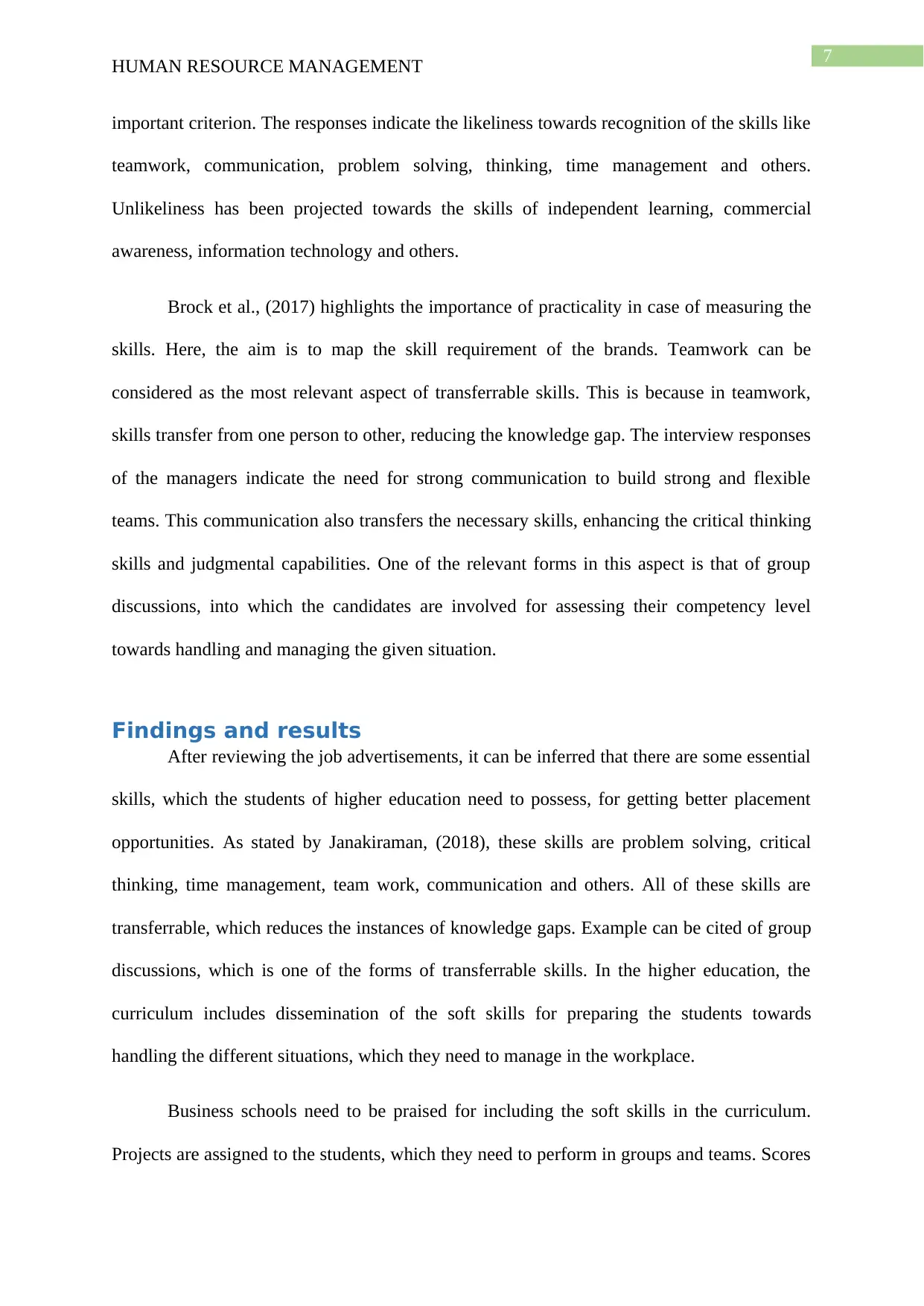
7
HUMAN RESOURCE MANAGEMENT
important criterion. The responses indicate the likeliness towards recognition of the skills like
teamwork, communication, problem solving, thinking, time management and others.
Unlikeliness has been projected towards the skills of independent learning, commercial
awareness, information technology and others.
Brock et al., (2017) highlights the importance of practicality in case of measuring the
skills. Here, the aim is to map the skill requirement of the brands. Teamwork can be
considered as the most relevant aspect of transferrable skills. This is because in teamwork,
skills transfer from one person to other, reducing the knowledge gap. The interview responses
of the managers indicate the need for strong communication to build strong and flexible
teams. This communication also transfers the necessary skills, enhancing the critical thinking
skills and judgmental capabilities. One of the relevant forms in this aspect is that of group
discussions, into which the candidates are involved for assessing their competency level
towards handling and managing the given situation.
Findings and results
After reviewing the job advertisements, it can be inferred that there are some essential
skills, which the students of higher education need to possess, for getting better placement
opportunities. As stated by Janakiraman, (2018), these skills are problem solving, critical
thinking, time management, team work, communication and others. All of these skills are
transferrable, which reduces the instances of knowledge gaps. Example can be cited of group
discussions, which is one of the forms of transferrable skills. In the higher education, the
curriculum includes dissemination of the soft skills for preparing the students towards
handling the different situations, which they need to manage in the workplace.
Business schools need to be praised for including the soft skills in the curriculum.
Projects are assigned to the students, which they need to perform in groups and teams. Scores
HUMAN RESOURCE MANAGEMENT
important criterion. The responses indicate the likeliness towards recognition of the skills like
teamwork, communication, problem solving, thinking, time management and others.
Unlikeliness has been projected towards the skills of independent learning, commercial
awareness, information technology and others.
Brock et al., (2017) highlights the importance of practicality in case of measuring the
skills. Here, the aim is to map the skill requirement of the brands. Teamwork can be
considered as the most relevant aspect of transferrable skills. This is because in teamwork,
skills transfer from one person to other, reducing the knowledge gap. The interview responses
of the managers indicate the need for strong communication to build strong and flexible
teams. This communication also transfers the necessary skills, enhancing the critical thinking
skills and judgmental capabilities. One of the relevant forms in this aspect is that of group
discussions, into which the candidates are involved for assessing their competency level
towards handling and managing the given situation.
Findings and results
After reviewing the job advertisements, it can be inferred that there are some essential
skills, which the students of higher education need to possess, for getting better placement
opportunities. As stated by Janakiraman, (2018), these skills are problem solving, critical
thinking, time management, team work, communication and others. All of these skills are
transferrable, which reduces the instances of knowledge gaps. Example can be cited of group
discussions, which is one of the forms of transferrable skills. In the higher education, the
curriculum includes dissemination of the soft skills for preparing the students towards
handling the different situations, which they need to manage in the workplace.
Business schools need to be praised for including the soft skills in the curriculum.
Projects are assigned to the students, which they need to perform in groups and teams. Scores
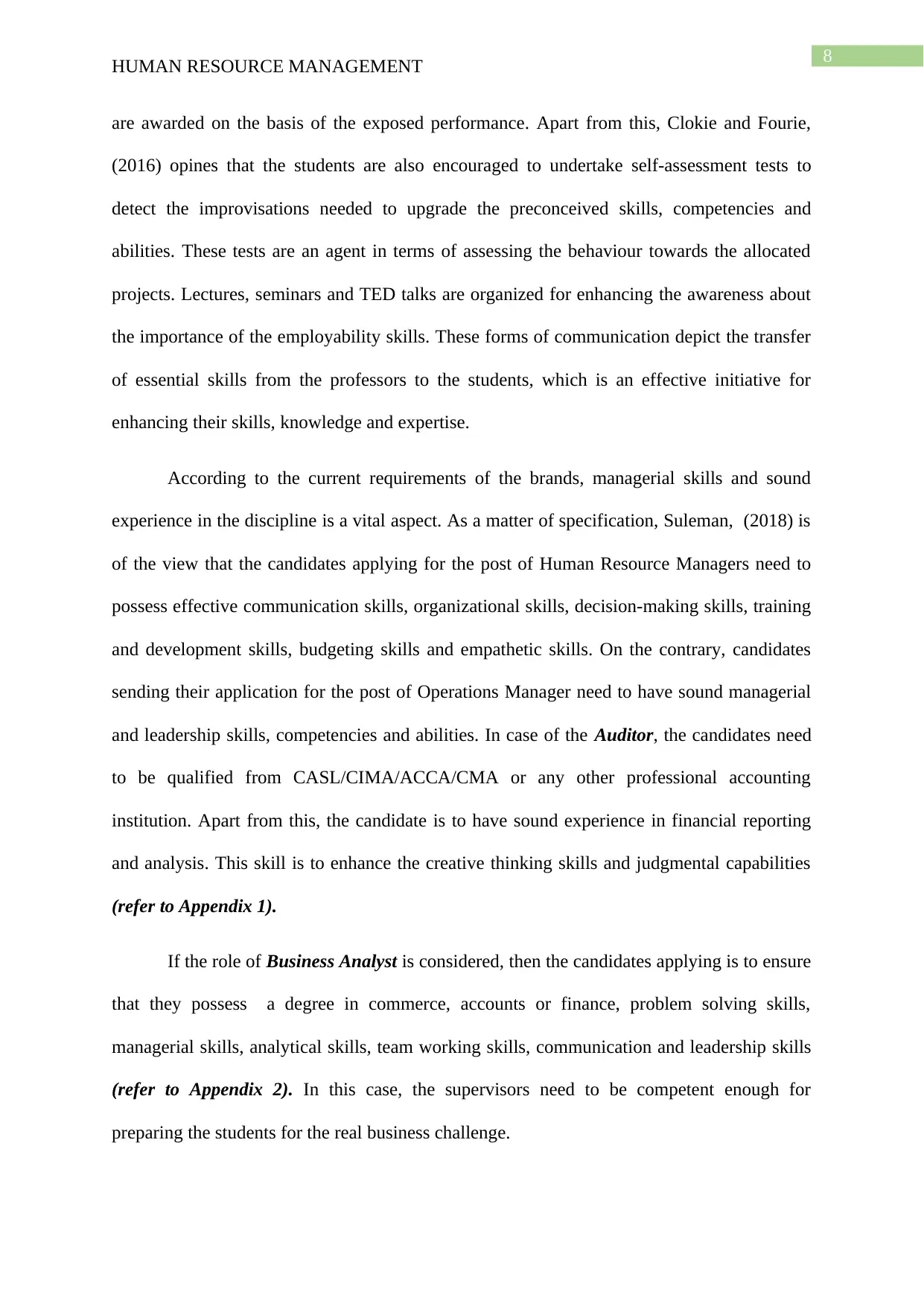
8
HUMAN RESOURCE MANAGEMENT
are awarded on the basis of the exposed performance. Apart from this, Clokie and Fourie,
(2016) opines that the students are also encouraged to undertake self-assessment tests to
detect the improvisations needed to upgrade the preconceived skills, competencies and
abilities. These tests are an agent in terms of assessing the behaviour towards the allocated
projects. Lectures, seminars and TED talks are organized for enhancing the awareness about
the importance of the employability skills. These forms of communication depict the transfer
of essential skills from the professors to the students, which is an effective initiative for
enhancing their skills, knowledge and expertise.
According to the current requirements of the brands, managerial skills and sound
experience in the discipline is a vital aspect. As a matter of specification, Suleman, (2018) is
of the view that the candidates applying for the post of Human Resource Managers need to
possess effective communication skills, organizational skills, decision-making skills, training
and development skills, budgeting skills and empathetic skills. On the contrary, candidates
sending their application for the post of Operations Manager need to have sound managerial
and leadership skills, competencies and abilities. In case of the Auditor, the candidates need
to be qualified from CASL/CIMA/ACCA/CMA or any other professional accounting
institution. Apart from this, the candidate is to have sound experience in financial reporting
and analysis. This skill is to enhance the creative thinking skills and judgmental capabilities
(refer to Appendix 1).
If the role of Business Analyst is considered, then the candidates applying is to ensure
that they possess a degree in commerce, accounts or finance, problem solving skills,
managerial skills, analytical skills, team working skills, communication and leadership skills
(refer to Appendix 2). In this case, the supervisors need to be competent enough for
preparing the students for the real business challenge.
HUMAN RESOURCE MANAGEMENT
are awarded on the basis of the exposed performance. Apart from this, Clokie and Fourie,
(2016) opines that the students are also encouraged to undertake self-assessment tests to
detect the improvisations needed to upgrade the preconceived skills, competencies and
abilities. These tests are an agent in terms of assessing the behaviour towards the allocated
projects. Lectures, seminars and TED talks are organized for enhancing the awareness about
the importance of the employability skills. These forms of communication depict the transfer
of essential skills from the professors to the students, which is an effective initiative for
enhancing their skills, knowledge and expertise.
According to the current requirements of the brands, managerial skills and sound
experience in the discipline is a vital aspect. As a matter of specification, Suleman, (2018) is
of the view that the candidates applying for the post of Human Resource Managers need to
possess effective communication skills, organizational skills, decision-making skills, training
and development skills, budgeting skills and empathetic skills. On the contrary, candidates
sending their application for the post of Operations Manager need to have sound managerial
and leadership skills, competencies and abilities. In case of the Auditor, the candidates need
to be qualified from CASL/CIMA/ACCA/CMA or any other professional accounting
institution. Apart from this, the candidate is to have sound experience in financial reporting
and analysis. This skill is to enhance the creative thinking skills and judgmental capabilities
(refer to Appendix 1).
If the role of Business Analyst is considered, then the candidates applying is to ensure
that they possess a degree in commerce, accounts or finance, problem solving skills,
managerial skills, analytical skills, team working skills, communication and leadership skills
(refer to Appendix 2). In this case, the supervisors need to be competent enough for
preparing the students for the real business challenge.
⊘ This is a preview!⊘
Do you want full access?
Subscribe today to unlock all pages.

Trusted by 1+ million students worldwide
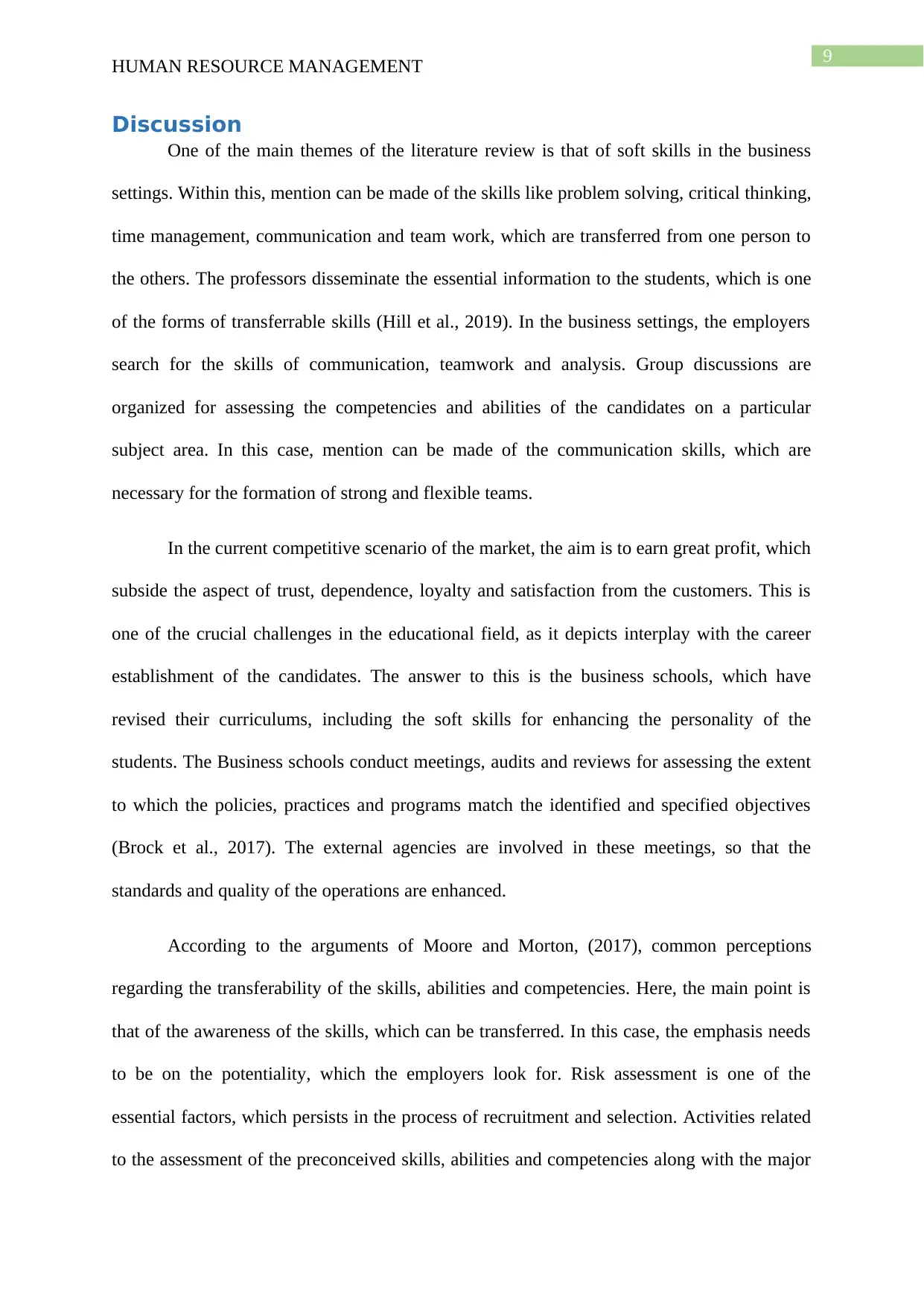
9
HUMAN RESOURCE MANAGEMENT
Discussion
One of the main themes of the literature review is that of soft skills in the business
settings. Within this, mention can be made of the skills like problem solving, critical thinking,
time management, communication and team work, which are transferred from one person to
the others. The professors disseminate the essential information to the students, which is one
of the forms of transferrable skills (Hill et al., 2019). In the business settings, the employers
search for the skills of communication, teamwork and analysis. Group discussions are
organized for assessing the competencies and abilities of the candidates on a particular
subject area. In this case, mention can be made of the communication skills, which are
necessary for the formation of strong and flexible teams.
In the current competitive scenario of the market, the aim is to earn great profit, which
subside the aspect of trust, dependence, loyalty and satisfaction from the customers. This is
one of the crucial challenges in the educational field, as it depicts interplay with the career
establishment of the candidates. The answer to this is the business schools, which have
revised their curriculums, including the soft skills for enhancing the personality of the
students. The Business schools conduct meetings, audits and reviews for assessing the extent
to which the policies, practices and programs match the identified and specified objectives
(Brock et al., 2017). The external agencies are involved in these meetings, so that the
standards and quality of the operations are enhanced.
According to the arguments of Moore and Morton, (2017), common perceptions
regarding the transferability of the skills, abilities and competencies. Here, the main point is
that of the awareness of the skills, which can be transferred. In this case, the emphasis needs
to be on the potentiality, which the employers look for. Risk assessment is one of the
essential factors, which persists in the process of recruitment and selection. Activities related
to the assessment of the preconceived skills, abilities and competencies along with the major
HUMAN RESOURCE MANAGEMENT
Discussion
One of the main themes of the literature review is that of soft skills in the business
settings. Within this, mention can be made of the skills like problem solving, critical thinking,
time management, communication and team work, which are transferred from one person to
the others. The professors disseminate the essential information to the students, which is one
of the forms of transferrable skills (Hill et al., 2019). In the business settings, the employers
search for the skills of communication, teamwork and analysis. Group discussions are
organized for assessing the competencies and abilities of the candidates on a particular
subject area. In this case, mention can be made of the communication skills, which are
necessary for the formation of strong and flexible teams.
In the current competitive scenario of the market, the aim is to earn great profit, which
subside the aspect of trust, dependence, loyalty and satisfaction from the customers. This is
one of the crucial challenges in the educational field, as it depicts interplay with the career
establishment of the candidates. The answer to this is the business schools, which have
revised their curriculums, including the soft skills for enhancing the personality of the
students. The Business schools conduct meetings, audits and reviews for assessing the extent
to which the policies, practices and programs match the identified and specified objectives
(Brock et al., 2017). The external agencies are involved in these meetings, so that the
standards and quality of the operations are enhanced.
According to the arguments of Moore and Morton, (2017), common perceptions
regarding the transferability of the skills, abilities and competencies. Here, the main point is
that of the awareness of the skills, which can be transferred. In this case, the emphasis needs
to be on the potentiality, which the employers look for. Risk assessment is one of the
essential factors, which persists in the process of recruitment and selection. Activities related
to the assessment of the preconceived skills, abilities and competencies along with the major
Paraphrase This Document
Need a fresh take? Get an instant paraphrase of this document with our AI Paraphraser
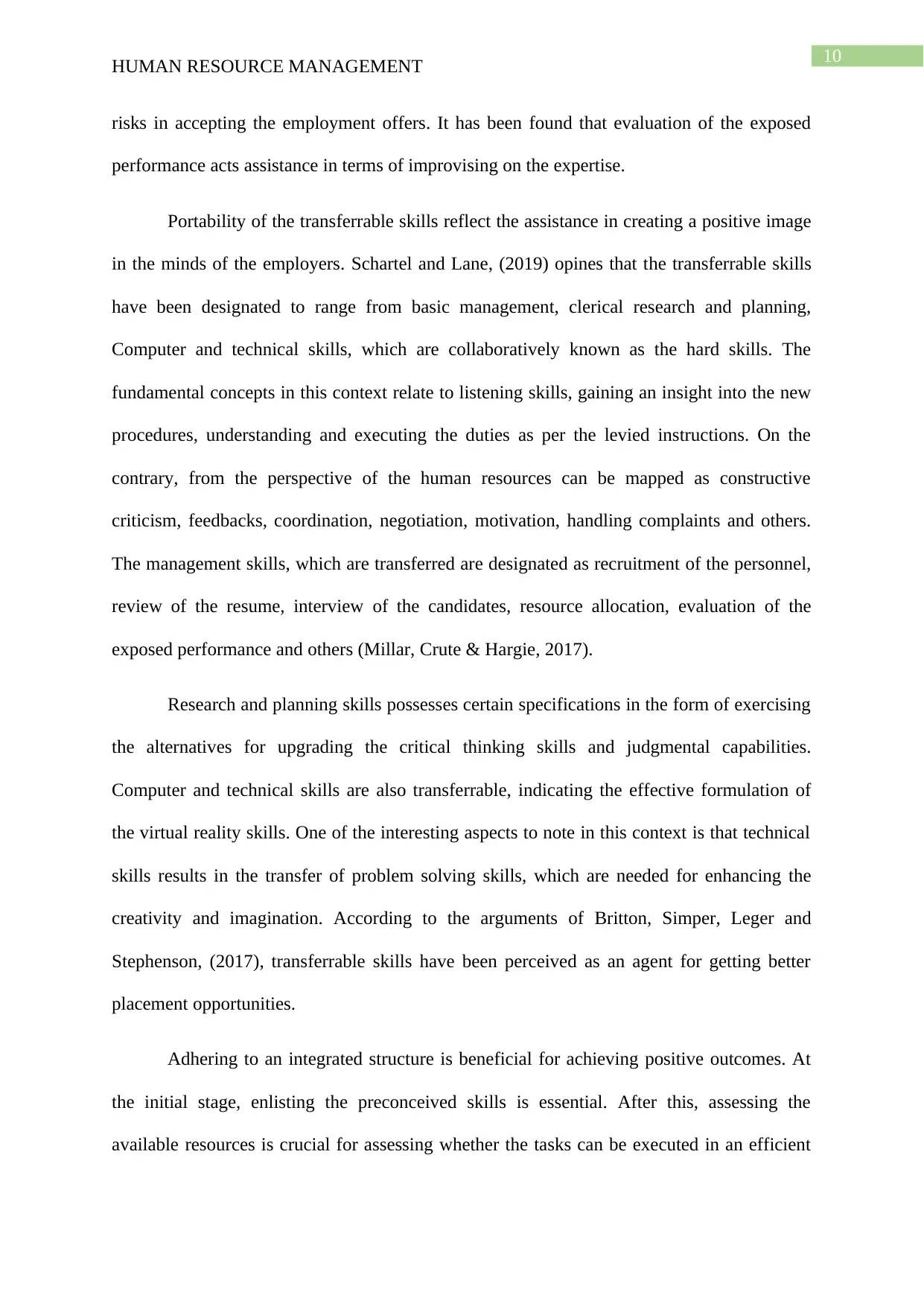
10
HUMAN RESOURCE MANAGEMENT
risks in accepting the employment offers. It has been found that evaluation of the exposed
performance acts assistance in terms of improvising on the expertise.
Portability of the transferrable skills reflect the assistance in creating a positive image
in the minds of the employers. Schartel and Lane, (2019) opines that the transferrable skills
have been designated to range from basic management, clerical research and planning,
Computer and technical skills, which are collaboratively known as the hard skills. The
fundamental concepts in this context relate to listening skills, gaining an insight into the new
procedures, understanding and executing the duties as per the levied instructions. On the
contrary, from the perspective of the human resources can be mapped as constructive
criticism, feedbacks, coordination, negotiation, motivation, handling complaints and others.
The management skills, which are transferred are designated as recruitment of the personnel,
review of the resume, interview of the candidates, resource allocation, evaluation of the
exposed performance and others (Millar, Crute & Hargie, 2017).
Research and planning skills possesses certain specifications in the form of exercising
the alternatives for upgrading the critical thinking skills and judgmental capabilities.
Computer and technical skills are also transferrable, indicating the effective formulation of
the virtual reality skills. One of the interesting aspects to note in this context is that technical
skills results in the transfer of problem solving skills, which are needed for enhancing the
creativity and imagination. According to the arguments of Britton, Simper, Leger and
Stephenson, (2017), transferrable skills have been perceived as an agent for getting better
placement opportunities.
Adhering to an integrated structure is beneficial for achieving positive outcomes. At
the initial stage, enlisting the preconceived skills is essential. After this, assessing the
available resources is crucial for assessing whether the tasks can be executed in an efficient
HUMAN RESOURCE MANAGEMENT
risks in accepting the employment offers. It has been found that evaluation of the exposed
performance acts assistance in terms of improvising on the expertise.
Portability of the transferrable skills reflect the assistance in creating a positive image
in the minds of the employers. Schartel and Lane, (2019) opines that the transferrable skills
have been designated to range from basic management, clerical research and planning,
Computer and technical skills, which are collaboratively known as the hard skills. The
fundamental concepts in this context relate to listening skills, gaining an insight into the new
procedures, understanding and executing the duties as per the levied instructions. On the
contrary, from the perspective of the human resources can be mapped as constructive
criticism, feedbacks, coordination, negotiation, motivation, handling complaints and others.
The management skills, which are transferred are designated as recruitment of the personnel,
review of the resume, interview of the candidates, resource allocation, evaluation of the
exposed performance and others (Millar, Crute & Hargie, 2017).
Research and planning skills possesses certain specifications in the form of exercising
the alternatives for upgrading the critical thinking skills and judgmental capabilities.
Computer and technical skills are also transferrable, indicating the effective formulation of
the virtual reality skills. One of the interesting aspects to note in this context is that technical
skills results in the transfer of problem solving skills, which are needed for enhancing the
creativity and imagination. According to the arguments of Britton, Simper, Leger and
Stephenson, (2017), transferrable skills have been perceived as an agent for getting better
placement opportunities.
Adhering to an integrated structure is beneficial for achieving positive outcomes. At
the initial stage, enlisting the preconceived skills is essential. After this, assessing the
available resources is crucial for assessing whether the tasks can be executed in an efficient
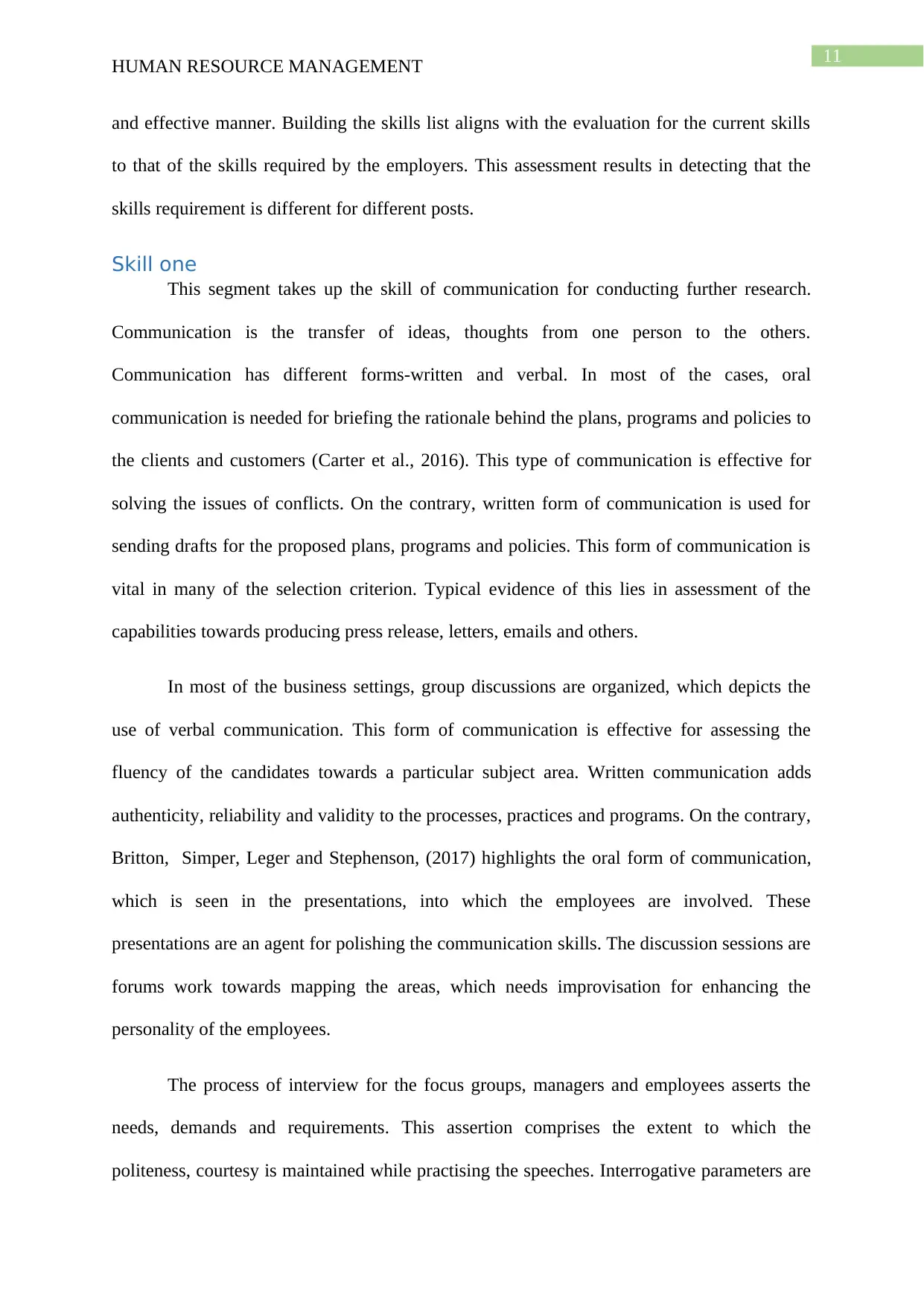
11
HUMAN RESOURCE MANAGEMENT
and effective manner. Building the skills list aligns with the evaluation for the current skills
to that of the skills required by the employers. This assessment results in detecting that the
skills requirement is different for different posts.
Skill one
This segment takes up the skill of communication for conducting further research.
Communication is the transfer of ideas, thoughts from one person to the others.
Communication has different forms-written and verbal. In most of the cases, oral
communication is needed for briefing the rationale behind the plans, programs and policies to
the clients and customers (Carter et al., 2016). This type of communication is effective for
solving the issues of conflicts. On the contrary, written form of communication is used for
sending drafts for the proposed plans, programs and policies. This form of communication is
vital in many of the selection criterion. Typical evidence of this lies in assessment of the
capabilities towards producing press release, letters, emails and others.
In most of the business settings, group discussions are organized, which depicts the
use of verbal communication. This form of communication is effective for assessing the
fluency of the candidates towards a particular subject area. Written communication adds
authenticity, reliability and validity to the processes, practices and programs. On the contrary,
Britton, Simper, Leger and Stephenson, (2017) highlights the oral form of communication,
which is seen in the presentations, into which the employees are involved. These
presentations are an agent for polishing the communication skills. The discussion sessions are
forums work towards mapping the areas, which needs improvisation for enhancing the
personality of the employees.
The process of interview for the focus groups, managers and employees asserts the
needs, demands and requirements. This assertion comprises the extent to which the
politeness, courtesy is maintained while practising the speeches. Interrogative parameters are
HUMAN RESOURCE MANAGEMENT
and effective manner. Building the skills list aligns with the evaluation for the current skills
to that of the skills required by the employers. This assessment results in detecting that the
skills requirement is different for different posts.
Skill one
This segment takes up the skill of communication for conducting further research.
Communication is the transfer of ideas, thoughts from one person to the others.
Communication has different forms-written and verbal. In most of the cases, oral
communication is needed for briefing the rationale behind the plans, programs and policies to
the clients and customers (Carter et al., 2016). This type of communication is effective for
solving the issues of conflicts. On the contrary, written form of communication is used for
sending drafts for the proposed plans, programs and policies. This form of communication is
vital in many of the selection criterion. Typical evidence of this lies in assessment of the
capabilities towards producing press release, letters, emails and others.
In most of the business settings, group discussions are organized, which depicts the
use of verbal communication. This form of communication is effective for assessing the
fluency of the candidates towards a particular subject area. Written communication adds
authenticity, reliability and validity to the processes, practices and programs. On the contrary,
Britton, Simper, Leger and Stephenson, (2017) highlights the oral form of communication,
which is seen in the presentations, into which the employees are involved. These
presentations are an agent for polishing the communication skills. The discussion sessions are
forums work towards mapping the areas, which needs improvisation for enhancing the
personality of the employees.
The process of interview for the focus groups, managers and employees asserts the
needs, demands and requirements. This assertion comprises the extent to which the
politeness, courtesy is maintained while practising the speeches. Interrogative parameters are
⊘ This is a preview!⊘
Do you want full access?
Subscribe today to unlock all pages.

Trusted by 1+ million students worldwide
1 out of 25
Related Documents
Your All-in-One AI-Powered Toolkit for Academic Success.
+13062052269
info@desklib.com
Available 24*7 on WhatsApp / Email
![[object Object]](/_next/static/media/star-bottom.7253800d.svg)
Unlock your academic potential
Copyright © 2020–2026 A2Z Services. All Rights Reserved. Developed and managed by ZUCOL.


